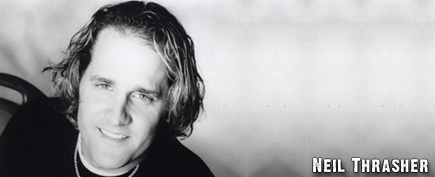Neil Thrasher's Continuing Education
By Robert L. Doerschuk
© 2006 CMA Close Up News Service / Country Music Association, Inc.
The first thing you notice about Neil Thrasher is his deadpan humor; he drops punch lines into his conversation, waiting for a beat or two to make sure they register. He uses that same timing when he's saying something he knows will make a different kind of impression.
"I learn something every time I write, but I don't know if I'll ever really find my own voice," he said. "Most writers never do."
This isn't the kind of talk you expect from a former ASCAP Songwriter of the Year, whose credits include Kenny Chesney's chart-topping "There Goes My Life" and Montgomery Gentry's smash, "Some People Change," along with hits by Diamond Rio, Reba McEntire, Rascal Flatts and Restless Heart. But the more he talks, the more unexpected twists Thrasher seems to take. He admits, for instance, that unlike most of his colleagues, he only began thinking of himself as a songwriter after he'd already been in Nashville for a while.
"I came here to be a star," Thrasher said. "I actually wouldn't be writing today if it weren't for my wife, Lana. She saw something in me that I didn't know I had. She's the one who set me up with writers here in town."
Music has been a constant passion in Thrasher's life. His parents met as performers of Southern gospel music, and Thrasher grew up listening to his father's successful quartet, the Thrasher Brothers.
"To me, it was all about the singing," he recalled. "I spent a lot of time at gospel shows, paying attention to everything: the voices, the showmanship, even the outfits the groups would wear. I've got album covers of my dad and his group in matching, fire-engine red suits, or in electric blue suits. They looked like the Mafia! I thought it couldn't get any cooler than that."
He was into rock 'n' roll too, at least until his father took the time to read the lyrics on one of his KISS albums. Still, by the time he got to Middle Tennessee State University in Murfreesboro, Tenn., he'd spent several years playing in bands. When a stomach infection ended his plans to play college football, performing seemed like the sensible thing to do. Then he met Lana, who was working at the office of his future publishing company, Major Bob Music. She brought him into the office, where he met another young talent, Kelly Shiver. Their voices blended beautifully as Thrasher Shiver, and the pair soon had an album out on Asylum Records and two CMA Vocal Duo of the Year nominations.
"Up to that point I wasn't planning on writing for a living," Thrasher said. "That's when I started paying more attention to structure and listening to how people actually said things and started putting that into my lyrics. Lana was helpful too. She's a great song person. I've learned a lot from her about what a good song is."
Lana was running Major Bob, helping to guide the exploding career of management client Garth Brooks when she met her future husband, who was singing with a gospel quartet, in 1992.
"It was through doing demos with that band that I met Neil," she said. "I just kept noticing that Neil had so much natural talent, and of all the people in the band he was just hungry and had that burning desire to do music."
Thrasher learned a lot from his future wife, including how to handle it when a publisher or artist edits your songs.
"Listening to someone else and knowing that you don't know everything is part of the learning process," Thrasher said. "For example, when Michael Dulaney and I wrote 'What Do You Say,' the third verse had a comedy thing to it - something about someone forgetting the words at a wedding. Reba loved the song, but she asked us, 'Can y'all write me a different third verse, about life and death?' She knew more than we did about what she wanted to say and what radio wanted to play. So we didn't hesitate, and that only made the song better."
For all he has learned, Thrasher admits that the deeper he gets into the creative process, the more mysterious it seems. Inspiration can come from anywhere, usually when you least expect it.
"Wendell Mobley and I were sitting in my living room; it was one of those brain-dead nights," he said. "Then Lana comes around the corner, lights three candles on the mantel and turns the light off. Wendell and I looked at each other, and then we called Gary LeVox. That's how we got 'I Melt'" (recorded by Rascal Flatts).
"The point is, there is no formula," Thrasher summed up. "It happens when it happens. A song can come to me here or at home, in my wife's office, or in my car."
How about on the golf course? Thrasher pulls down his shades and smiles. "Well, we can say we're working out there. That sounds like a good excuse to me."
On the Web: www.majorbob.com/writers/current/thrasher.htm


November 14, 2006
© Kiss Kavanas